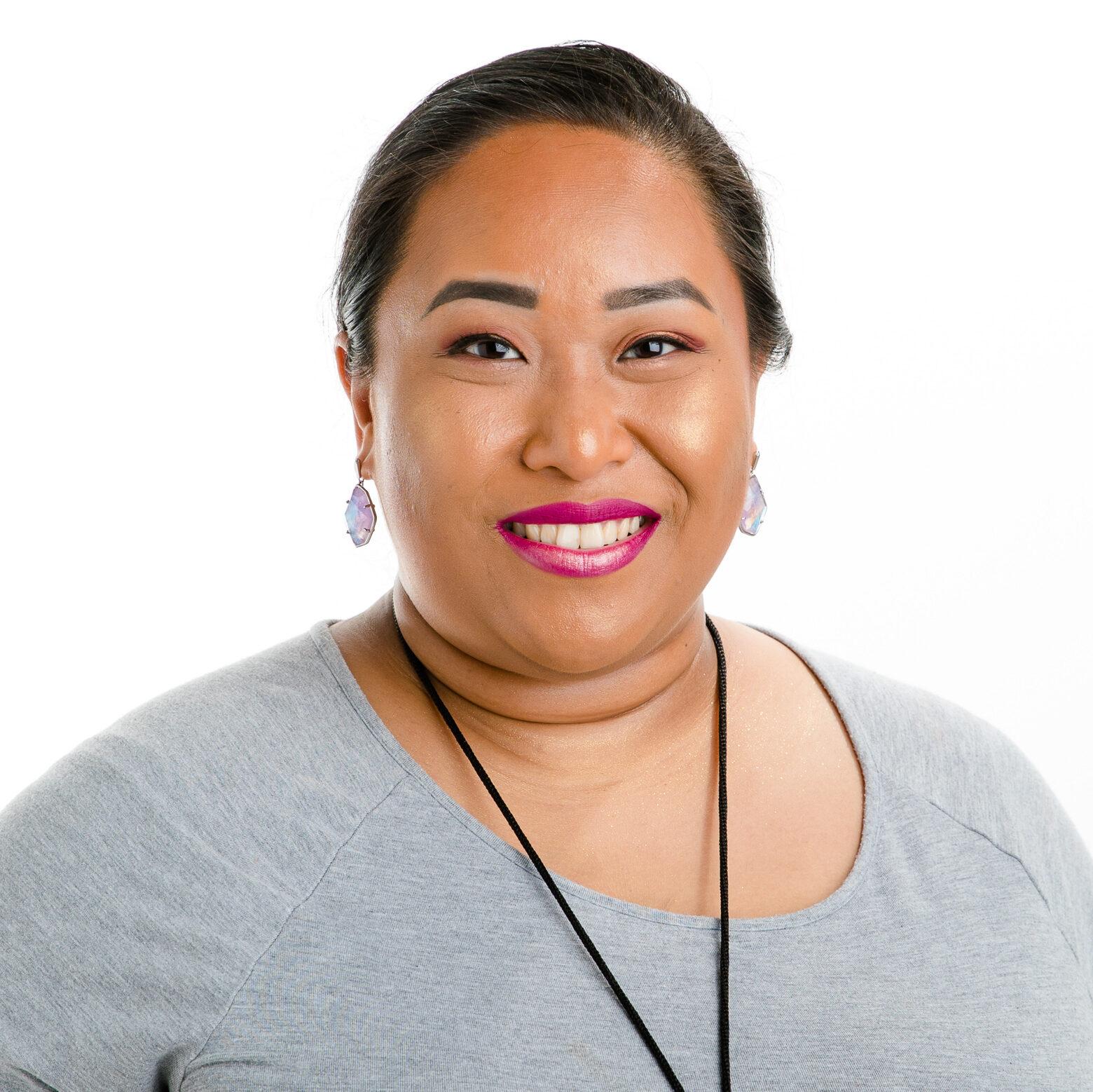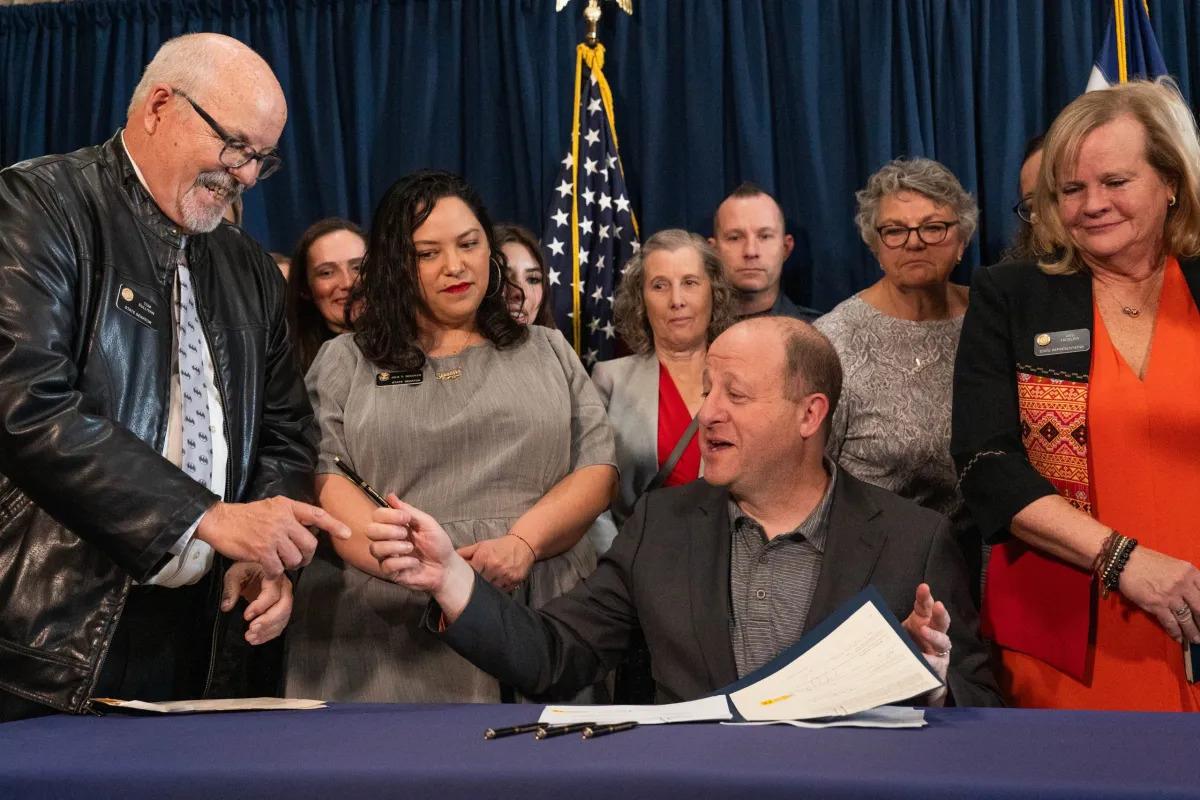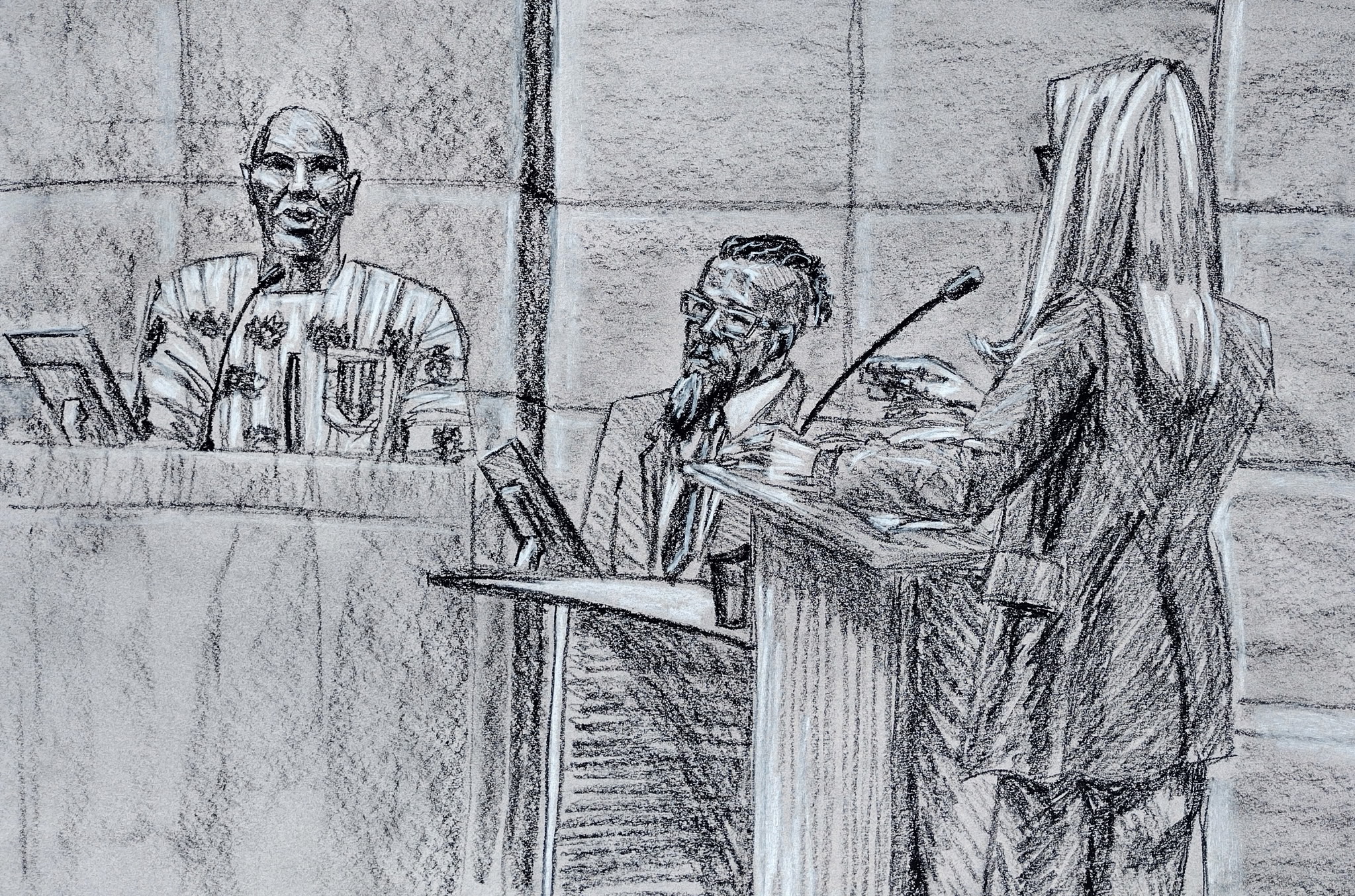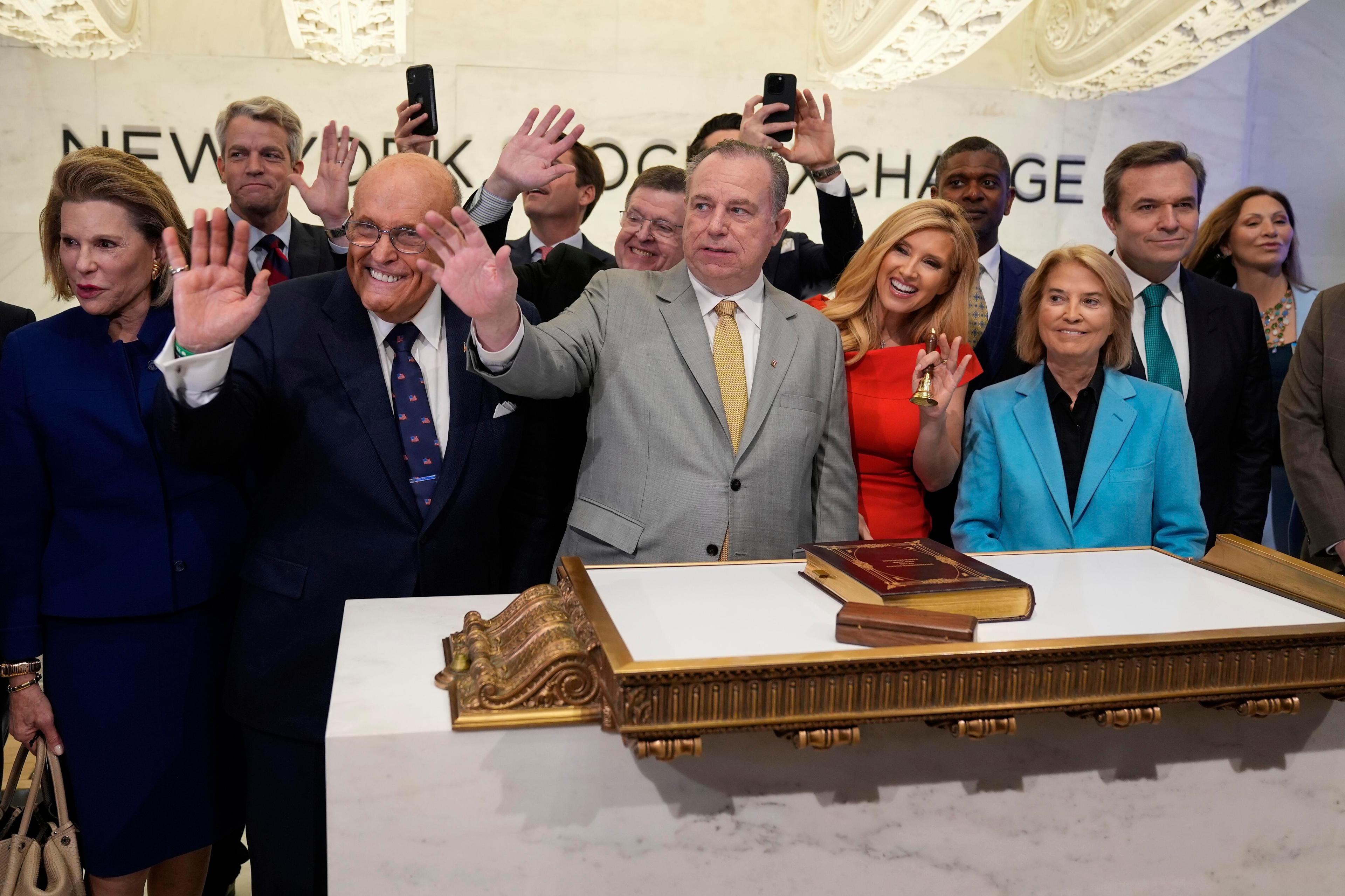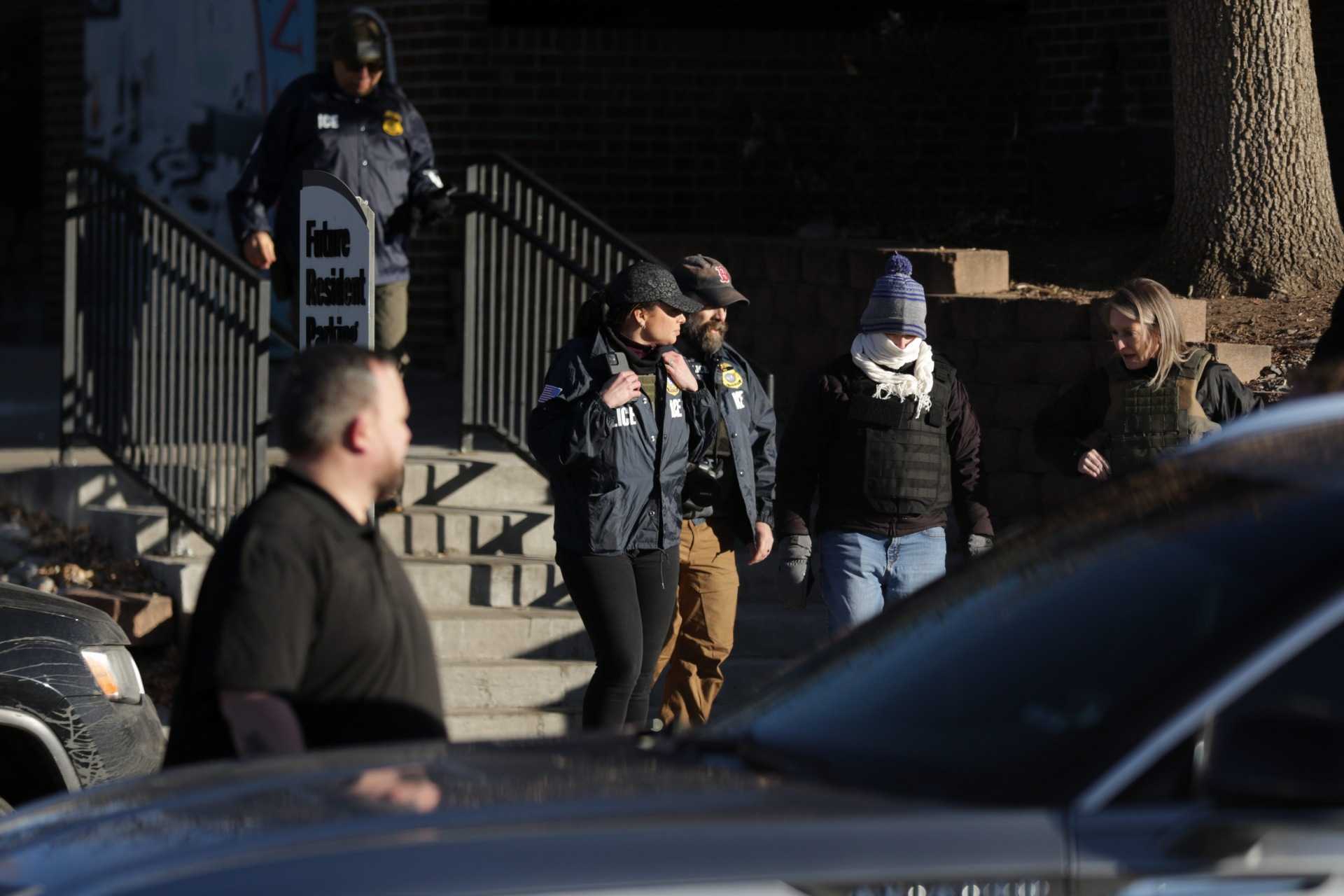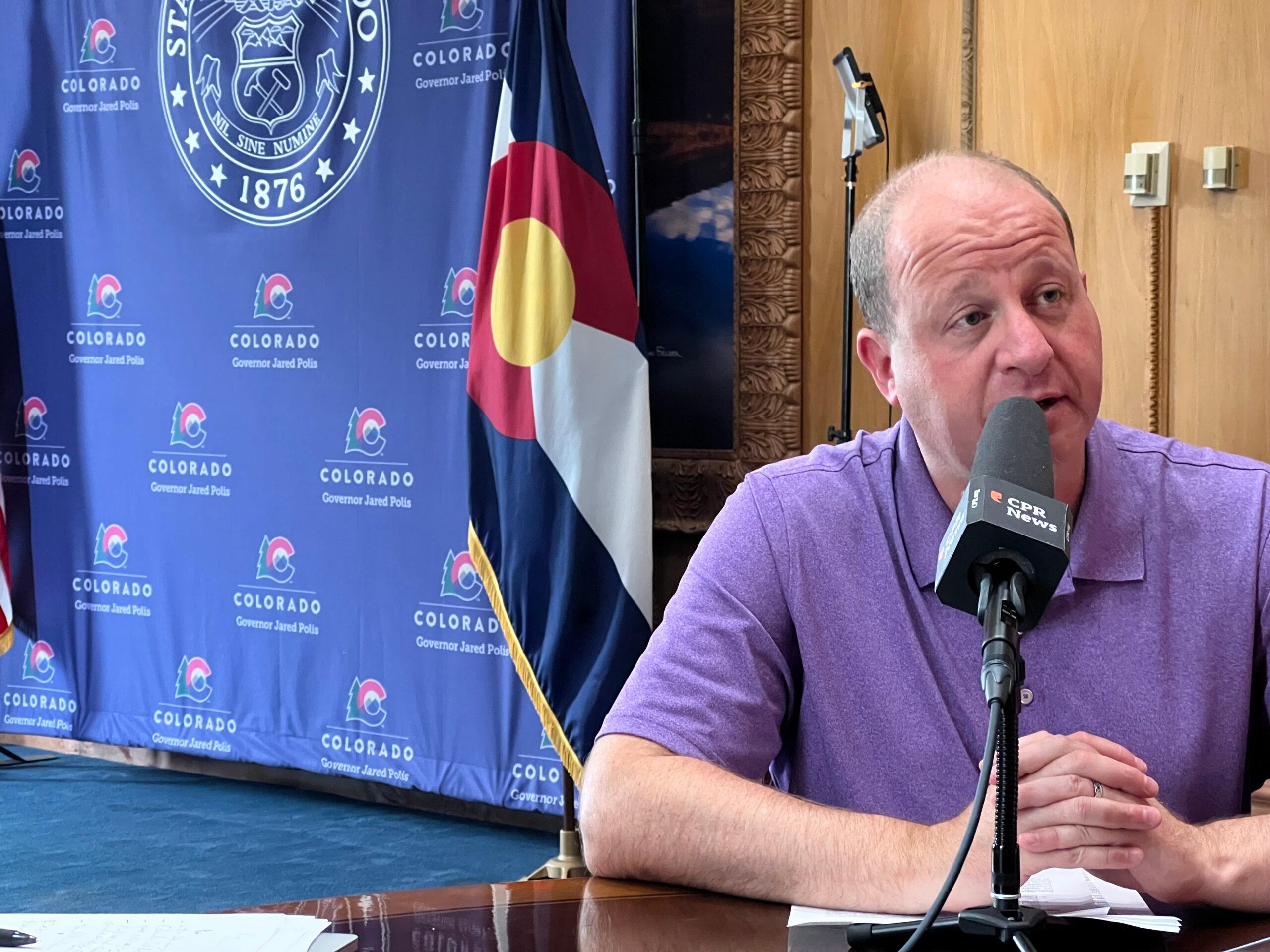
In the wake of rising inflation and increased cost of living, Colorado Governor Jared Polis’ administration is releasing TABOR refunds early in the Colorado Cash Back program.
The program will send out $750 per person or $1,500 to people who filed taxes jointly. The checks are currently in the mail. In his regular conversation with Colorado Matters, Polis said it was irresponsible to sit on the money for a year instead of releasing it now.
Critics have argued that distributing the money just months before the election (in which Polis is running) is politically calculated timing, but Polis said that this take is a cynical one. “The truth is, we wanted to move up the refund by about a year to people because they need it now,” he said. “To say that the government should sit on your money is just ridiculous.”
In the wide-ranging conversation, Polis spoke about measures the state is taking to hire and retain more teachers, and the current state of wolf reintroduction on the Western Slope. Additionally, he talked about the state’s response to the growing number of monkeypox cases in Colorado — there were 62 cases in the state in July. He said his focus is on education and prevention, and that people who also want the vaccination can sign up at the Colorado CDPHE website starting Aug. 5.
This interview has been edited for clarity and length.
Ryan Warner: Governor, thanks for having us in your office.
Gov. Jared Polis: It's a pleasure to see you, Ryan.
Warner: These TABOR checks are going out three months from the midterms. I wonder if you have any trouble with the optics of that.
Polis: I think that's the real example of cynicism: To say that because there's an election, the government should hold onto your money for another year. The truth is, we wanted to move up the refund by about a year to people because they need it now. To say that the government should sit on your money is just ridiculous. The sooner we can get it out, the better. People are going to get them in the next week.
Some people ask why they didn't come out earlier: To be clear, this [fiscal] year didn't end until June 30th, so none of this could even start moving till July, and we got them out pretty quickly here the first week in August.
So people are going to get them — $750 per person, $1,500 per joint filer. In addition to that, an income tax cut for every Coloradan, from 4.55 percent to 4.5 percent for all income earned this year. Then there will be additional money refunded next April as well when people file their taxes.
Warner: To continue to play the cynic, will your name appear anywhere on the check, the envelope or enclosed letter?
Polis: That's a good question. I think in a mock-up check we had earlier, it was signed by the comptroller, the treasurer — those two people sign checks. There will be a note from me explaining what this is, and websites and phone numbers for people to call.
The most important thing is not so much the people that get it; they will be happy, they will cash. Everybody who filed taxes for 2021 should get one. There will probably be 2 percent that moved or the mail got lost — You don't lose out on your $750. That's the main message I want to send. If you don't get it by the end of August, go to coloradocomebackcash.com and you can make sure that you get it.
Now, if you haven't filed taxes for 2021 — and of course, if you earn an income, you better have filed taxes for 2021 because it's a legal requirement. But if you didn't have any taxable income, you might not have filed for 2021. You actually still can: You can file by October 17th and you'll get [the check] hopefully by Christmas. The Department of Revenue says by January, but our goal is to get those out by Christmas for anybody who hasn't filed yet.
Warner: The note that will come with the check, is that a little icky in a midterm election year?
Polis: Well, it just explains the basics of why people are getting the check. There's a lot of people who don't know this is coming and so they have to make sure this is not like some loan. It's in fact a refund check. People have to know it's not a scam; It's legit. I mean, people need to cash this check. This is serious. This is important. This is needed.
I would add that many of the tax cuts and fee reductions we did in the legislature actually don't take effect till '23, '24. Our biggest one was the property tax cut; That is for '23 and '24. It was a two-year property tax cut.
Warner: Critics on both sides take issue with you labeling this the Colorado Cash Back program. Conservatives say that it erases TABOR, the Taxpayer's Bill of Rights, from the messaging. On the left, the concern is that by not making it clear where this money comes from, you're making it less clear that in a world without TABOR, this is money that might pay for education or roads. Is the Colorado Cash Back label obfuscating this, separating it from TABOR?
Polis: Look, a rose by any other name would smell as sweet. So, whatever you want to call it, it's $750 in your pocket, $1,500 for joint filers. Of course, it's on every website — the source of these funds — it's one of four TABOR refund mechanisms.
Warner: Should we now count you as a fan of TABOR?
Polis: I've always been in the “mend it, don't end it” camp, right? Without a question, people should be able to vote on tax increases. There's parts that I think we can do better. Like for instance, the formula for the spending cap and how that relates to inflation. I'll give you a perfect example: because we're in an inflationary period right now across the entire economy.
This year, it's based on the prior-year inflation. So, the state budget went up 3.1 percent when there's 8 or 9 percent inflation. Now, it'll catch up. But next year, when who-knows-what inflation will be — Let's say it goes back down to 2 or 3 percent — Then the state budget will go up 8 or 9 percent. I would love to eliminate that lag and also to figure out how we can have an index that makes sense as part of that formula.
Warner: Your drumbeat is to save people money. Yet this summer, new fees on delivery and ride sharing went into effect. How does that square with your saving money message?
Polis: Well, when you're governor, you don't get to write the bills; You just sign or veto them. So, our priority in that bill was a reduction in vehicle registration fees and we got that. So everybody — if you're a family with, let's say, two cars, you will pay less in fees and taxes unless you have more than 84 deliveries. I get it that some people do, but many people have less than 84 food deliveries or whatever it is. Again, to a certain extent, I think people understand why it makes sense: What used to be a quiet cul-de-sac, now there might be three delivery vans going in and out.
Polis: I mean, those roads are being used more and whether it's Amazon — whoever it is — somebody's got to pay for that extra wear and tear on the roads. It ought to be those folks that are running those trucks into residential neighborhoods.
Warner: There are fears of a recession. I wonder if that is something you are braced for?
Polis: I'm braced for whatever lies ahead. My background is in business. We've been doing great on job creation. We have one of the strongest economic recoveries in the nation. So, our economy is strong. Obviously, no one has a crystal ball and you can talk to five economists and get 10 opinions about what the future will bring. But certainly, the state has record levels of reserves in our budget and we're well positioned to weather whatever lies ahead.
Editor’s note: A spokesperson for the Colorado Department of Treasury said the state does have a record level of reserves, but it will drop as TABOR refund checks are cashed.
Warner: Are the people that you consult when it comes to the economy, are they telling you to brace for a recession?
Polis: The only certainty at this point is uncertainty, because of all the risk in the global environment? Are supply chains going to get better or worse? Will the war in Ukraine be resolved or will it escalate? There are so many factors that what you see among economists is a much greater range of uncertainty: Everything from solid and continued growth to recession.
Another great concern is inflation: What is being done to combat inflation? Of course, I think the federal government should do more. I've thrown a few things into that mix, like reducing tariffs. What can a state do? Not a lot, other than try to get more money back to people to keep up with rising costs, which is what the Colorado Cash Back money that people will be getting in the next week or two is all about.
Warner: Transit systems across the state are offering free fares this month on buses, light rail and trains. State grants are making this possible, with the idea of improving air quality by getting people out of their cars. According to our transportation reporter, Nathaniel Minor, a previous attempt at this in the 1970s by RTD in Denver didn't really move the needle in terms of long term commuter shifts. How will you gauge the success of this month?
Polis: First of all, this is one of the hundred things we're doing to save people money. This is saving people money on bus fairs across many areas, not just RTD, but many other transit districts across the state — making that free. We've also slashed the prices of Bustang and Pegasus: Denver to Vail is, I think, 10 bucks now. In terms of what it does for ridership, we are going to be very interested in looking at the date on that. I don't think we can discern much from the 1970s, we're a very different state.
My folks moved here in 1970 and I was born a few years later. We are a very different state, [with] very different commuting habits, very different demographics. I think this will be learning for the whole nation to see exactly who takes advantage of this, who stays with ridership and how it impacts our air quality in the long run, how it helps our transit systems in the long run. In the short term, the biggest impact is simply saving people money that might need to go to groceries or rent or other rising costs.
Editor’s note: In the legislation passed that allows for free fare on public transportation, there is not a mechanism in place that will keep track of air quality, so it will be difficult to determine whether air quality improved during the free-fare period.
Warner: So, the point is: this is an experiment. You will look at the results and I suppose you'll make decisions from there about whether you might give similar grants to RTD and other agencies in the future.
Polis: That's right. That's right. This is a timed program, but it's one that, depending on how it works, the state would be interested in piloting or expanding in future years. It's one of our many pollution-reduction components. We passed a significant air quality package this last legislative session, [and] one of the highlights is converting school buses to electric school buses. It’s important for kids' health and saving school districts money on diesel fuel, so they can put that money back in the classroom and teacher pay and smaller class size. We are always very data driven and we will be looking forward to what the impact of the free transit fares across August look like.
Warner: According to your State Health Department, there were 62 reported cases of monkeypox in July. That was up from just six the month prior. Governors in California and Illinois have declared states of emergency over this virus. Can we expect you to do the same Governor Polis?
Governor Polis: Well, we're always looking at the data in real time. We've administered at our Colorado Department of Public Health and Environment over 1,800 doses of the vaccine. As you know, the vaccine is a limited supply; [It’s] different from when COVID hit and there was no vaccine. That first year was really awful. All we could do was try to stay safe. There already is a vaccine very effective for monkeypox; We've had 16 clinics.
We've now enrolled 35 vaccine providers across the state to administer the doses. We're looking to get them out to communities that are at risk. You ask very specifically about emergency: What we always look at, is there a reason for that? Does that open up more federal funding? We don't just do these kinds of things for the heck of it. We're always looking at [whether] there is some opportunity or reason to use [an emergency declaration] to more effectively either get vaccines out or reduce the spread of monkeypox.
Warner: You don't see an imminent need for that at this point?
Polis: No. Nothing that we've seen yet shows a benefit to the state in terms of funding or anything else from taking that measure now, but we certainly don't rule anything out.
Warner: You cite that there have been 1,800 doses distributed. There's not enough monkeypox vaccine to meet demand. At last check, the signup form at CDPHE was closed, citing extremely limited supply from the federal government. Governor, I think about your actions early in the COVID pandemic: You didn't wait for the feds to act in some regards. You sought, for example, PPE on the international market. Should Colorado act as its own agent when it comes to monkeypox given how limited the federal supply is?
Polis: To be clear, we don't face a shortage of protective equipment. We have hospital capacity, there are treatments for monkeypox. I want to be clear at this point: this is not a medical capacity issue. We are always looking at anything we can do better on prevention. That means outreach to groups that are impacted; Keeping the public informed. And of course, moving aggressively as we can both with the federal government, and if opportunity arises, other providers to make more vaccines available to Coloradans.
Warner: I'll just say there are people who have gotten a first shot for monkeypox — It's a two-dose vaccine — and they have been told by the State Health Department that there's not enough vaccine for the second yet. Is that where Colorado should be?
Polis: To be clear, we will have our signup sheet open again by this Friday. That includes both Coloradans who want to complete the vaccine series and get the second vaccine, as well as people who want to begin that. Now, that doesn't mean that every single person can get that on Saturday, but at least they will be able to sign up. We're expecting a significant additional supply of the vaccine in the coming days and weeks.
Warner: Here we are banding between viruses. Let's go back to COVID.
Polis: The other one.
Warner: The other one. The vaccination rate for COVID for children under five years old lags behind other age groups. This is true in Colorado and across the country. Right now, it has plateaued in this state at around 8 percent. Are you trying to move that needle? Pardon the pun.
Polis: Yeah, certainly when it comes to vaccination, the top priority is getting third and fourth doses to people in their 70s and 80s, right? That's the highest risk of hospitalization, highest risk of death. Beyond that in general, I strongly support vaccination. My kids are eight and 10. They got their third dose. Many parents might not be aware if your kids are six or 15, the FDA and CDC have recommended a third dose.
The truth is when you're vaccinated, there's a lower risk. We also know that risk correlates with age. I'm 47 — I haven't gotten that fourth dose yet. I've had three. I'm hopeful, and I'm also being critical of the FDA during all of this: I hope they approve the omicron-specific vaccine quickly soon. And when they do, I'll be very eager to get that myself.
Warner: And to those specifically under five years old, do you have particular concerns about that low rate?
Polis: I encourage parents to look at that along with other childhood vaccinations. There's a whole host of vaccinations that parents should get for their kids, and I hope they get them on schedule, and I hope that their pediatrician is administering COVID-19 along with other critical childhood vaccines. I think what a lot of parents are doing is they might have an annual physical and hopefully that would be an opportunity around when they're getting other vaccines to also get the COVID vaccine.
Warner: Why not require a COVID-19 vaccine on the list of required shots for public school?
Polis: Well, in Colorado, while we strongly encourage parents to make the right decision (they get the kids vaccinated) vaccines are not required. Any parent can opt out of that.
Warner: Well, they're required until they're opted out of.
Polis: Right. They can opt out of those vaccines.
Warner: Why not do that for COVID-19?
Polis: Well, it's a vaccine that still has the experimental authorization. I think that many parents want to make sure that it is more than just an experimental authorization before they would want that. But there's nothing to stop school districts and schools from looking at those measures. I'm not aware of any that have [done that] in our state, but again, we value in our state individual liberty and privacy. It's really up to parents on any vaccine.
Warner: Speaking of school, it's back-to-school time. I wonder if there are some specific ways that your administration is trying to attract and retain teachers. I know there was $52 million in federal relief money spent to address the shortage. Any signs that it's working? Any new fronts on this?
Polis: First of all, we're thrilled that parents [whose kids are going] back to school will get this $750 — $1,500 for a couple — in time for back-to-school expenses.
Warner: You seem to drop that number in at every occasion.
Governor Polis: It's very useful for back-to-school expenses. In our recent state budget this year increased funding for school districts by about 9 percent. What does that mean for a class of 25 kids? We increased the budget by about $12,000. Now it's up to school districts [to decide] how to spend that, but obviously, one of the things they're looking at is to increase teacher pay.
Now they also look at reducing class size. They look at adding specialties and getting some of the arts back in the schools. There's many other things they need to consider. We have local administration of schools. I completely support that, but the state has stepped up as a funding partner to enable our districts to pay more competitive salaries to attract and retain teachers.
Warner: Are you seeing that happen? Are the results visible yet or is it too early?
Polis: It depends on different parts of the state. We absolutely hear about areas where they filled most or all of their positions. I also hear about districts where they're beginning the year with some positions vacant and having to do what they can — either having central staff in the classroom and substitutes. But, across most districts, most positions are filled; It's not at crisis levels. Obviously, if it's your kid who starts with a substitute, I get it: that's a crisis for you. I hope the district fills that as quickly as possible, but that is rare in our state.
Warner: So you think pay is the fundamental mechanism to hiring and retention?
Polis: There's more to it than pay. I think it's about respect for our educators. There is a market decrease in civility across many institutions in our country. When people take out their frustrations on classroom teachers, it absolutely has a detrimental effect on our ability to attract and retain excellent professional classroom teachers to help our kids achieve academically.
So I would call on everybody: whatever frustrations you have, talk to your elected school board, yell at your legislators, yell at me, but don't yell at your teachers for unrelated issues. They're doing their best to make sure that your kid gets a great education.
Warner: In neighborhoods surrounding this state Capitol, one is constantly acquainted with the reality of homelessness. Encampments spring up, get cleared, and then spring up again. It seems more Coloradans than ever are sleeping in tents, carrying their worldly belongings with them. Governor, help us understand what goes through your mind when you see those scenes? Talk to me as governor, but also as a Coloradan.
Polis: We're no stranger to that here at the state Capitol. There have been encampments near the state Capitol and we've had to work with Denver as a jurisdiction. Homelessness is an issue that cities have to lead on solving, and people should understand that even in Denver, even when [people experiencing homelessness are] right near the Capitol, we rely entirely on Denver.
That doesn't mean the state should be doing nothing, and I'm proud to say we're doing a lot. We're stepping up and we're matching local investments in recovery and addiction treatment bets. One example is near Aurora: We identified a facility, and we're partnering with Aurora to build upwards of 500 residential treatment beds to help get people off of drugs, to help give them support they need, to get them back to work and have a housing plan after they get out.
I think what most Coloradans want to see is not on the street, but we want to make sure that there's a way to help and get better. So the state is focused on making sure we have that ability through housing opportunities that can help get people clean and back into the mainstream.
Warner: Why do you think the problem is as bad as it is now? You've pointed to addiction; What else do you think is at play?
Polis: I'd say addiction is a big piece of it, but I would say: mental health and behavioral health, more broadly. Now, in some cases, you would say it's an undiagnosed or untreated behavioral health issue that might lead to or facilitate addiction. In other cases, it might be a mental health issue independent of addiction.
We want to make sure that we upgrade our behavioral health resources. That's why we have focused on centralizing our behavioral health response as a state. We work through local partners, but we want to make sure that the state can meet the behavioral health needs of residents ideally to prevent them from falling into homelessness, and also to help those who are in homelessness be able to recover and get off the streets.
Warner: The Supreme Court ruling on a gun law in New York has put a big question mark over other state and local gun laws. Do you think restrictions like the red flag law in Colorado, the magazine limit here will stand potential court tests?
Polis: First of all, the red flag law has actually been endorsed nationally by Democrats and Republicans in a bipartisan gun safety package that passed the United States Senate and was signed by President Biden. Colorado will be seing additional resources from that to do outreach around the red flag law which can absolutely act to prevent suicides, as well as potentially other violent acts.
Warner: Do you think that's in jeopardy now?
Polis: The case in New York, I've been advised by our legal counsel, is a very different area of law. So, in no area has a red flag law been struck down. Quite to the contrary, bipartisan majority — Republicans and Democrats — came together to support this concept federally. So I'm not aware of any legal jeopardy that it's in.
Warner: Colorado Matters heads to the Western Slope next month, and we will broadcast from Grand Junction. Wolf reintroduction is a big story there; There was a narrowly successful ballot measure to force the state to reintroduce wolves. Now, environmentalists say that plan has been hijacked by ranching and hunting interests. Do you think the plan that's emerging follows the will of the voters?
Polis: I think the real reason you're going to Grand Junction in August is for the peaches, right Ryan?
Warner: Oh, the peaches and there's a lavender wine in Palisade that I might imbibe.
Polis: We have some wonderful vineyards in the Grand Valley. The voters statewide voted on wolf reintroduction. This is different from the fact that a few wolves naturally come over from Wyoming. So there are a few wolves here — maybe three, maybe five — but they're not always tracked all the time. Separately from that, the voters said we are going to do a reintroduction of wolves, and Colorado Parks and Wildlife is working on a plan to do that. Part of that is incorporating the legitimate concerns of ranchers and people that live in areas directly impacted by wolves in that process of successful reintroduction.
Warner: Do you think that their voice is being heard amply? Being heard too much? Swaying the process because environmentalists —
Polis: Since we run the process, I'm partial to saying it's the right amount: We absolutely listen to everybody. Do ranchers have legitimate concerns? Of course. We want to make sure that wolves are reintroduced to Colorado consistent with the will of the voters and the way that addresses many of the concerns that ranchers have from predation. In fact, the initiative took that into account. It specified that ranchers would be compensated for predation.
States that already have wolves, like Wyoming, have a Wolf Predation Compensation Fund. Colorado also has that designated, and we're still in the process of implementing that because the wolves got ahead of the reintroduction. The wolves came before we set up the system that the voters approved — that will be set up consistent with the reintroduction which will be in sustainable numbers. Wolves are not in Colorado in sustainable numbers. They will be pursuant to the law of Colorado and the will of the voters by December of 2023.
Warner: Governor, thank you for being with us.
Polis: Thank you Ryan, always a pleasure.
